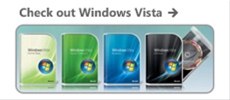Here's what the IE team and I have been up to. Good times! (I love that we get press releases for our features...)
Back from Foo Camp
I just got back from Foo Camp. It's late, so I'll have to write more later, but sufficed to say I had a great time, learned a lot, met some amazing people, and made some good connections for work. I even met someone who went to my high school in Minnesota (albeit many years after I did).
I had a lovely drive back from Sebastopol too, going out to coast and then driving south to San Francisco down highway 1. (Click here for the route, just for reference). I met up with my college friend Connie at Town Hall for a fantastic dinner and then headed home.
Fun Dinner at Canlis
I just came back from a very enjoyable dinner at Canlis with the Internet Explorer Program Management leads; these are basically the people who I work with who run the group that design the next versions of IE, organize the effort to ship it, and lead the work to take care of customers after we ship. Unfortunately, Chris Wilson couldn't make it, but he was off on some amazing SCUBA diving trip, so I don't feel too bad...
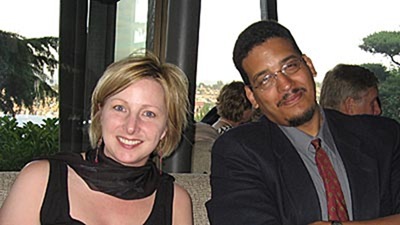
As with most teams, some of us have worked together for a while; some of the group came to IE more recently. We work together pretty well, but we haven't all gone out together and just had a fun meal; we were overdue.
Canlis is an old Seattle institution; it's the "dress up" restaurant in Seattle (one of the only ones with a dress code in town). We had a fun time telling stories, getting to know each other better, and generally not talking about work for a few hours. It was also fun to see everyone dressed up a bit.

The food was lovely, of course. I started with steak tartare to die for; easily the best I've ever had. We also had a few orders of truffle fries because the only thing better than fried food is fried food with truffle oil.
Then I had the Yukon River salmon. As I had blogged about earlier, I was looking forward to a chance to try it and had it tonight -- lovely. It was grilled simply (the best way for a fantastic piece of fish) with a little couscous on the side. Yum.
We also had some very nice wines -- some of my favorites
- 1990 Pol Roger -- I love Champagne; I think it makes every event a celebration. I don't know tons about vintages and such, but I recalled that 1990 was a fantastic year for Champagne. This was my first (I think) bottle of Pol Roger. Lovely. Dry and delicious.
- 2000 Peter Michael Les Pavot - Peter Michael is one of my favorite wineries, and the Les Pavot is really great. I'm not sure I've had the 2000 before, but once it opened up it was fantastic.
- 2004 Domaine Serene Pinot Noir - This is definitely one of my favorite pinot noirs, if not my very favorite. The consensus around the table seemed to be that this one was the best wine of the night, even though it was the least expense (although still not cheap...)
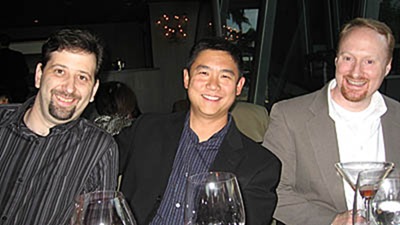
On top of the great food and wine, we got to see the Duck Dodge, a sailboat race in Lake Union and a Seattle tradition. I'm not sure anyone but I cared, but I liked it so there you go.
I had a great time; it's important to me to work with people I like. Tonight was a good reminder of why I love my job.
Keeping Perspective on Microsoft
At Microsoft, we love to beat ourselves up, in some ways even more than others do (and that's saying something.) We focus so much on the clever things our competitors do (as if we're supposed to be the only ones with good ideas) or the successes they have that we sometimes lose track of the great things we've done.
I saw this article go by a few months ago and thought it was a good reminder of our success in one area at least: our financial success. I've been meaning to post this for a while now, but I think it's still relevant. Of course, we must never become complacent or too proud of what we've done, but it's good to have a little balance.
SeekingAlpha
10 Reinvigorating Facts About Microsoft's Profits
Monday April 30, 5:57 am ETJoe Panettieri (The VAR Guy) submits: I have written extensively about Microsoft's (NasdaqGS: MSFT) problems. But last week, I got a stunning reminder about the company's power. It takes Microsoft only 10 hours of business to exceed Red Hat's entire quarterly profit. Skeptical? Check out the math, and nine other facts about Microsoft's most recent earnings report.
Microsoft last week announced quarterly revenue of $14.4 billion and net income of $4.93 billion. In other words, Microsoft's daily net income is about $55 million. That's $55 million in pure profit every 24 hours. Do some quick math and you'll learn it takes Microsoft only about...
- 10 hours or so (yes, hours!) to exceed Red Hat's (NYSE: RHT - News) quarterly net income of $20.5 million.
- four days to exceed Research In Motion's (NasdaqGS: RIMM) quarterly net income of $187.9 million.
- four days to exceed Starbucks' (NasdaqGS: SBUX) quarterly net income of $205 million.
- one week to exceed Nike's (NYSE: NKE - News) quarterly net income of $350.8 million.
- two weeks to exceed McDonalds' (NYSE: MCD - News) quarterly net income of $762 million.
- two weeks to exceed Apple's (NasdaqGS: AAPL) quarterly net income of $770 million.
- 18 days to exceed Google's (NasdaqGS: GOOG) quarterly net income of $1 billion.
- 23 days to exceed Coca-Cola's (NYSE: KO - News) quarterly net income of $1.26 billion.
- five weeks to exceed IBM's (NYSE: IBM - News) quarterly net income of $1.85 billion.
- 10 weeks to exceed Wal-Mart's (NYSE: WMT - News) quarterly net income of $3.9 billion.
For a dead company, Microsoft's profits certainly look lively.
From http://biz.yahoo.com/seekingalpha/070430/33932_id.html?.v=1
(Fixed character problems)
Best Microsoft ad ever
As a long time Microsoft employee, I am saddened and sometimes embarassed by the consistently, um, poor quality of our ads. It makes me very happy when I see a great ad coming out of the company. Invariably, it seems that they come out of our international subsidiaries and not Redmond.
Here's a very well done and funny ad from the Dutch sub. Here's the blog of the guy who did the ad.
Here's an old one from the New Zealand sub that was fantastic too. I think it was pulled though by the corporate police. Too bad.

Anyway, enjoy.
More on Cross Platform Development
Adam Nash wrote a nice follow-up to my post on cross platform development, which was, in turn, a reply to his post on the topic.
While the discussion appears to be a debate, I actually find myself agreeing with what Adam says (or not disagreeing at least.)
- We both agree writing cross platform software is hard and can go horribly awry when done poorly.
- We both agree that well-executed cross-platform software is a sign of an excellent development team.
- We both agree (if you read the comments, etc.) that games and productivity software may be different in the need to be "native" feeling (that games like WoW don't need to feel "OS X-like" or "Vista-like" because they take over the whole screen and don't really interact with other apps or the OS.
- We even agree that working cross platform teaches and grows developers in a way that working on a single platform may not.
Where we may disagree is whether this productivity gain offsets the additional costs of working cross platform. I suppose that depends on the product, how much additional work is required to work cross platform, and how good your team is.
Finally, Adam is correct to introduce what is, perhaps, the ultimate metric by which to determine whether a team should do cross platform work: which approach will allow the product to best succeed? Ultimately, this depends on the metrics of success for that product and the market they're in.
In particular, he raises the question of whether our decision to focus IE on a single platform was smart and whether that decision opened the door for Firefox. It's my belief that web browsing should be an integrated part of the overall computing experience, not simply a sandboxed TV-set on the Internet. The work we did on the RSS platform in IE7 and the availability of IE components as Windows platform elements are a reflection of that view. I don't know how efficiently we could further this model by working cross platform. Success for me and IE is how well we can deliver on this vision, so single-platform development makes sense for us. (We had Mac and Unix versions of IE in an earlier day when browser share was our only success metric. As our view changed, those versions made less sense, so we dropped them.)
I think Firefox was able to establish their share because they brought a solid browser to the market when we took our eye off the ball and had stopped investing in the browser; I don't think the fact they're cross platform helps them that much. The vast majority of their users are on Windows (I don't think they're even the most popular browser on the Mac). I really wonder if they'd be better off just focusing on Windows; looking at their bugs and work items, they certainly have a lot of work to do keeping FF running well on Macs, downlevel Windows, and Linux distros. Could they have delivered more of the stuff they had to cut from Firefox 2 if they only had to do Windows? Probably. Would it have mattered? Who knows.
At the end of the day, the market will decide which approach is best in each case. I wouldn't have it any other way.
Cross Platform Development
Adam Nash, a very smart friend of mine from college who writes the great blog Psychohistory, recently mentioned that he thinks it's a great sign when a developer goes cross-platform almost immediately, citing the Joost beta for Mac OS X.
I started writing a comment in reply, but it started getting long enough to warrant a post and trackback.
As usual, Adam's reasoning is sound, especially considering his background in VC. He's right that a company that can build great cross platform apps simultaneously probably has a great development team. However, I'd argue that cross platform development rarely produces the best products.
First, the product often winds up representing the lowest common denominator of the capabilities of the OS' they serve. They are often not as polished or well-integrated as native apps. Firefox is a good example of this from a UI perspective. While it's certainly a pretty well-written app, it's not as native-looking on the Mac as Safari or on Windows Vista as IE7. In both cases, Firefox is a bit out of place. (Read this post on Coding Horror for a similar opinion.)
Also, in order to ease development, cross platform apps often have intermediate layers to factor out the underlying OS. These layers can impede performance and may prevent the app from taking advantage of native services like DirectX or Quartz. The resulting apps aren't usually as fast as their native counterparts. Microsoft's Mac apps certainly ran into this problem when writing cross platform "core code" apps on our Windows Layers for Macintosh (WLM) back in the mid '90s (anyone remember Mac Word 6?)
Finally, developing cross platform reduces the overall innovation a developer can provide. Building for multiple operating systems (or browsers) is never less work than building for one. The time spent architecting, coding, testing, and debugging for multiple platforms is time not spent adding new features, making the product more reliable or secure, or satisfying other user demands (or saving investors' money).
There are certainly no guarantees of a gorgeous, OS-exploitive, fast application when you target only one OS, but its's way harder when you are trying to serve multiple masters.
There's no doubt that teams that can execute cross platform consistently well over time are probably great, but just think what they could accomplish if they chose to focus all that talent and energy on one platform.
Anyway, go read Adam's blog. Lots of good stuff there, especially his financial posts.
IE Team New Year's Party
The IE team let loose Friday night at the Fenix to celebrate Lunar New Year. Felicity, our brilliant group assistant (and the woman who really runs the team), figured that having a traditional end-of-year holiday party was a bad idea -- too many conflicts, hard to get a baby sitter, too expensive to get a venue, etc. In light of our bad weather in December, this was particularly lucky.
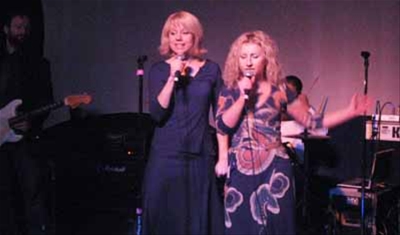
Anyway, aside from the pool tables and normal club stuff at the Fenix, Felicity had the Rockaraoke band there. As I've blogged about before, Rockaroake is like normal karaoke, except you sing with a live band. It's tons of fun, especially when you know everyone who is singing. There were some surprisingly talented people on the team and some whose willingness to please their significant others outweighed their singing talent. Perhaps not surprisingly, it seemed that the Program Managers (stereotypically the most extroverted/attention seeking of the job functions) did much of the singing, although there were clearly representatives from the other disciplines including Katya and her friend Stephanie in the photo above. (In the interest of full disclosure, I sang Margaritaville solo and Summer Nights with Kellie - and yes, Kellie, I will continue to link to that horrible photo of you until you start blogging or otherwise create a presence on the web.)
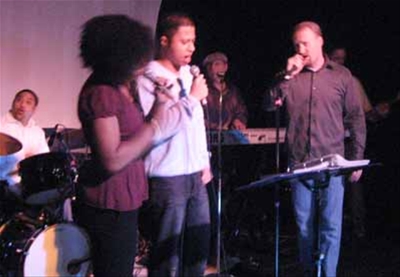
The event was also special because team members could bring a guest. It was great to meet the spouses and significant-others and to really thank them for their sacrifices. We focus a lot on how hard a team works to ship something like IE; it's easy to overlook the burden our long nights and weekends places on our families and friends.
Good times.
Download Windows Vista Now!
Hurray! Windows Vista (and Office 2007) are finally available to real people (not that business people aren't real too...) Most people will get Vista with a new PC, but if you're dying to get it now, you can buy and download a copy from Windows Marketplace. This is the first time we've sold Windows or Office online via download. Pretty cool. Check it out!
Zune: More Brand Awareness Needed
Andrew (9): "Could I have an iPod? Maybe an iPod Nano?"
Us (two Microsoft employees): "Well, maybe for your birthday we can get you a Zune."
Andrew [confused]: "An iPod Zune?"
Um, I think we still have a long way to go on Zune awareness...
